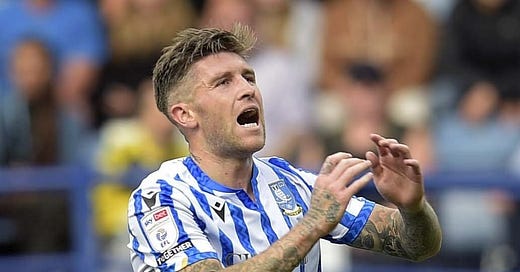Notwithstanding Saturday’s win against West Bromwich Albion, this has not been the best of starts to the season for Sheffield Wednesday, who are languishing at the lower end of the Championship.
Once again, there are whispers that owner Dejphon Chansiri is preparing the club for a sale, though there have been similar noises on many previous occasions with no resulting transaction.
Danny Röhl
Long suffering Owls fans would have hoped for better after the great finish to last season under “Danny, Danny Röhl”, who guided Wednesday to safety, thus avoiding what seemed like an inevitable relegation.
The young German coach was justifiably proud of this achievement, “We wrote history. Never before has a team taken only six points from their first 17 matches and stayed in the league.”
Promotion from League One
It was not meant to have turned out this way, following a dramatic promotion to the Championship in 2022, when Wednesday scored in the last minute of extra time to beat Barnsley in the League One play-off final in front of over 43,500 Owls fans.
However, the positive mood around the club was badly dented when manager Darren Moore left the club “by mutual consent” just a few weeks after the Wembley triumph.
The big man was replaced by former Watford manager Xisco, but he only lasted three months, before exiting stage left in October 2023, when Röhl took the reins.
Chansiri
It was around this time that Chansiri announced that he would not be investing any more money into the club following protests against the owner.
The Thai businessman didn’t pull any punches, “I am the one who needs to pay around £2m on average every month. Some fans need to have more respect for owners of clubs and not be so selfish, thinking of their own benefit without doing anything good to the club.”
He added, “This is not acceptable and as a result I am not willing to inject more money while I am being treated unfairly by those fans.”
Transfer Embargo
Chansiri had failed to pay an outstanding invoice from HMRC, citing cash flow issues, so the EFL imposed a transfer embargo in October 2023.
The owner first asked the fans to stump up money to cover this debt, “If you want to save your club, this is your chance. Do not protest, save your club. If not, we will get a transfer ban over three windows, there’s a possibility we will go to League Two or the National League.”
“If 20,000 people gave £100 then it’s £2m, and it’d be clear - so we can finish it. That would cover everything, HMRC and the wages.”
However, the very next day Chansiri confirmed that he had paid the HMRC debt and also the club’s players and staff, so the transfer ban was lifted.
Points Deductions
This is not the first time that Wednesday have got into trouble with the football league under Chansiri.
In July 2020 they were deducted 12 points by an independent disciplinary panel for breaking the league’s spending rules. Specifically, the club had included the sale of the Hillsborough stadium in its 2017/18 accounts despite the ground being sold a year later.
This was subsequently reduced to 6 points, but it was still decisive, as Wednesday would have avoided relegation from the Championship without this penalty.
A year later the club accepted a suspended six-point deduction for failing to pay their players on four occasions (March 2021, April 2021, May 2021 and June 2021).
League Position
In fairness to Chansiri, he very nearly took Wednesday back to the Premier League in the early part of his tenure, as Wednesday reached the Championship play-offs twice in 2015/16 and 2016/17.
He spent big on the squad during this period, but ultimately the gamble failed and led to the club’s difficulties in complying with the EFL’s Profitability and Sustainability Rules.
Since those heady days, Wednesday have struggled, steadily falling down the Championship table, before being relegated to England’s third tier in 2021.
That said, at least they are now back in the Championship, where hope springs eternal.
So let’s take a look at Wednesday’s financial position. Ideally, this would be based on their finances in the Championship, but the latest available accounts are from the 2022/23 promotion winning season in League One, so we will have to use these.
This review will also include some comparisons with the Championship to see how much investment Wednesday required to have a decent chance of success in England’s second tier.
Profit/(Loss) 2022/23
In 2022/23 Wednesday’s pre-tax loss was virtually unchanged at £7.2m, even though revenue increased by £3.0m (18%) from £16.3m to £19.3m, as this was offset by operating expenses also rising £3.0m (13%) from £23.7m to £26.7m.
Profit from player sales slightly fell from £1.0m to £0.9m, but interest payable reduced from £1.0m to £0.8m.
The loss after tax was smaller at £6.5m, thanks to a £0.7m tax credit.
The revenue increase was driven by commercial activities, which rose £2.3m (37%) from £6.4m to £8.7m, though match receipts & associated turnover were also up £0.6m (6%) from £10.0m to £10.6m.
Note: Wednesday do not separate match day and broadcasting in the accounts, so I have estimated the split based on similar sized clubs in League One.
Keep reading with a 7-day free trial
Subscribe to The Swiss Ramble to keep reading this post and get 7 days of free access to the full post archives.







